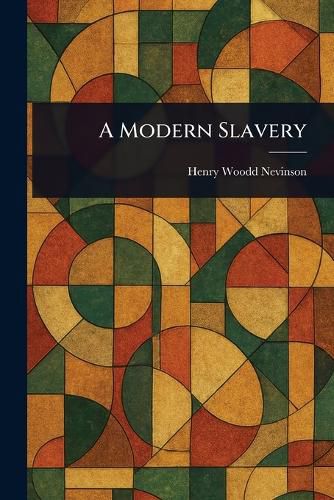Readings Newsletter
Become a Readings Member to make your shopping experience even easier.
Sign in or sign up for free!
You’re not far away from qualifying for FREE standard shipping within Australia
You’ve qualified for FREE standard shipping within Australia
The cart is loading…






This title is printed to order. This book may have been self-published. If so, we cannot guarantee the quality of the content. In the main most books will have gone through the editing process however some may not. We therefore suggest that you be aware of this before ordering this book. If in doubt check either the author or publisher’s details as we are unable to accept any returns unless they are faulty. Please contact us if you have any questions.
Henry W. Nevinson's "A Modern Slavery" offers a stark and unflinching look at forced labor practices on the cocoa plantations of Portuguese Africa, specifically on the islands of Sao Tome and Principe. This historical account, meticulously prepared for print republication, documents the realities of slavery in the early 20th century. Nevinson's investigation exposes the brutal conditions endured by laborers, shedding light on a system that thrived under the guise of colonial economics.
This crucial work examines the social, economic, and historical context of slavery during this period, exploring the dynamics of power and exploitation within the cocoa industry. "A Modern Slavery" remains a vital resource for understanding the legacy of slavery and its impact on global economies. Its enduring relevance makes it essential reading for anyone interested in African history, the history of slavery, and the social sciences.
This work has been selected by scholars as being culturally important, and is part of the knowledge base of civilization as we know it.
This work is in the public domain in the United States of America, and possibly other nations. Within the United States, you may freely copy and distribute this work, as no entity (individual or corporate) has a copyright on the body of the work.
Scholars believe, and we concur, that this work is important enough to be preserved, reproduced, and made generally available to the public. We appreciate your support of the preservation process, and thank you for being an important part of keeping this knowledge alive and relevant.
$9.00 standard shipping within Australia
FREE standard shipping within Australia for orders over $100.00
Express & International shipping calculated at checkout
This title is printed to order. This book may have been self-published. If so, we cannot guarantee the quality of the content. In the main most books will have gone through the editing process however some may not. We therefore suggest that you be aware of this before ordering this book. If in doubt check either the author or publisher’s details as we are unable to accept any returns unless they are faulty. Please contact us if you have any questions.
Henry W. Nevinson's "A Modern Slavery" offers a stark and unflinching look at forced labor practices on the cocoa plantations of Portuguese Africa, specifically on the islands of Sao Tome and Principe. This historical account, meticulously prepared for print republication, documents the realities of slavery in the early 20th century. Nevinson's investigation exposes the brutal conditions endured by laborers, shedding light on a system that thrived under the guise of colonial economics.
This crucial work examines the social, economic, and historical context of slavery during this period, exploring the dynamics of power and exploitation within the cocoa industry. "A Modern Slavery" remains a vital resource for understanding the legacy of slavery and its impact on global economies. Its enduring relevance makes it essential reading for anyone interested in African history, the history of slavery, and the social sciences.
This work has been selected by scholars as being culturally important, and is part of the knowledge base of civilization as we know it.
This work is in the public domain in the United States of America, and possibly other nations. Within the United States, you may freely copy and distribute this work, as no entity (individual or corporate) has a copyright on the body of the work.
Scholars believe, and we concur, that this work is important enough to be preserved, reproduced, and made generally available to the public. We appreciate your support of the preservation process, and thank you for being an important part of keeping this knowledge alive and relevant.